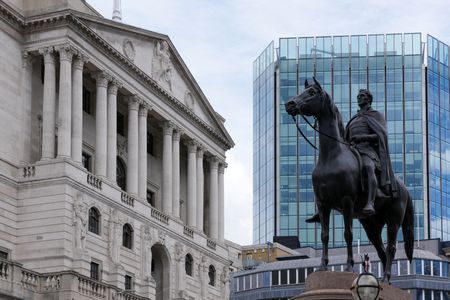By Mike Dolan
LONDON (Reuters) -Whatever new year fillip the euro zone economy got from ebbing natural gas prices, the UK saw none of it – showing just how peculiarly British the downturn there has become and heaping pressure on the Bank of England.
January business surveys from around the world on Tuesday saw euro zone economic activity expanding again for the first time since June – helped by an unusually warm winter that’s seen more than a halving of sky-high natural gas prices over the past six weeks.
Although Britain saw the same easing of wholesale energy prices, UK industry – by stark contrast – continued to contract this month. In fact it shrank at its fastest pace in two years, with everything from inflation and rising interest rates to worker shortages, serial labour strikes and mounting Brexit damage being blamed. Sterling suffered its biggest one-day drop against the euro on Tuesday in over a month.
And even if you think surveys can be wayward from time to time, the Confederation of British Industry’s poll of manufacturers doubled down on the message and showed order books weakening further this month despite an easing of cost pressures.
Whatever the precise reason for the persistent gloom, it leaves the central bank in a pickle as it tries to rein in still double-digit inflation and record private sector pay growth without sinking the housing-sensitive economy even deeper into the mire.
The BoE meets again next week and there are growing calls for it start to wind up its year-long campaign of interest rate hikes that have already brought its main policy rate to 3.5% from just 0.1% in December 2021.
Whatever the merit of those calls, most forecasters suspect the BoE will press on for now. More than two thirds of the 42 economists polled by Reuters this month expect another hefty 50 basis point rate rise to 4% next week, while their average ‘terminal rate’ forecast implies yet another quarter point rise to 4.25% after that.
Financial market pricing is even more aggressive. Despite economic funk, the implied peak BoE rate derived from money and swaps markets shows almost another full percentage point of hikes to 4.5% before the Bank calls it quits later this summer.
What state the economy will be in by then is anyone’s guess.
But significant outliers in the forecasting world feel an already fraying consensus within the BoE’s policymaking council could yet see tightening halted far sooner than the herd imagines. Two of the nine voters – Silvana Tenreyro and Swati Dhingra – already voted to leave rates unchanged last month, arguing that policy tightening to date was “more than sufficient” to get inflation back to target.
HSBC economists Elizabeth Martins and Simon Wells this week stuck doggedly to their call that the BoE has just one more quarter point hike in the tank next week and then it’s done and dusted at 3.75% – almost 75bp below where markets are priced.
ONE AND DONE?
Although they acknowledge the BoE’s concern about still-tight labour markets and rising pay growth, they insist policymakers are switching sides, last year’s rate hikes will hit with a delay and the BoE’s standing forecasts already show inflation falling back way below target over the next couple of years.
“Rate rises affect the economy with long and variable lags – the impact of this cycle is only beginning to take hold,” the HSBC team told clients.
It’s a big call – emboldened by the weak January business readout and huge overshoot in government borrowing last month.
One counter argument from HSBC’s high street rival Barclays – who see another half point rate rise next week and a 4.25% terminal rate – is that this week’s surveys weren’t enough to “materially impact” critical labour market and price metrics yet and service sector readings were “only modestly contractionary”.
Either way, the eventual outcome leaves the BoE and the pound in something of a half way house.
Which way does sterling jump – keeping tabs on the euro amid a surprising rejuvenation of the euro economy and more hawkish European Central Bank, or tracking a falling dollar on similarly negative U.S. surprises and prospect of another downsizing of the Federal Reserve’s rate rises to a quarter point next week?
Perhaps it just gets left mid Atlantic somewhere – not unlike the country’s increasingly unanchored political and economic position.
Hedge fund manager Stephen Jen at Eurizon SLJ thinks the post-Brexit UK orientation – or lack thereof – is still hard to figure.
“I’m still puzzled by why (Prime Minister Rishi) Sunak seems busier signing more defence pacts than trade pacts. The UK’s cyclical and structural failings by the government post-Brexit are evident.”
Jen reckons the UK could see more likeness in the U.S. economic constellation of twin trade and external deficits and a shrunken labour force. But in practise, the pound would likely be caught in the middle of what’s likely to be another 10% drawdown in the dollar more broadly this year.
“My guess is that if the dollar does continue its descent, cable should rise by default though (the pound) may under-perform the euro.”
The opinions expressed here are those of the author, a columnist for Reuters.
(By Mike Dolan, Twitter: @reutersMikeD; Editing by Andrea Ricci)

